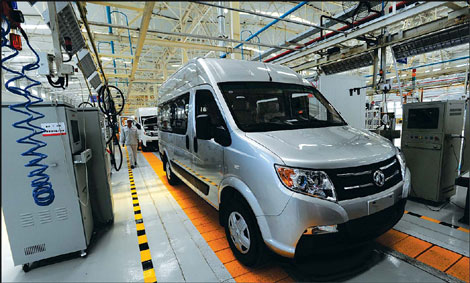Domestic auto giants in fracas over foreign technology claims
Updated: 2012-07-02 15:01
By Han Tianyang (China Daily)
|
|||||||||||
|
A Dongfeng Yufeng rolls off the production line. The company claimed the van employs technology from LDV, a van maker SAIC acquired in 2009. Provided to China Daily |
SAIC reminds Dongfeng on IP rights from Britain's LDV
Intellectual property disputes between domestic carmakers and foreign companies have been common as China develops its own automotive industry, but a recent conflict over technology is between two homegrown giants.
SAIC Motor Corp, the biggest-selling Chinese carmaker, said in an emailed statement on June 18 that it "exclusively acquired" light bus technologies from British commercial van maker LDV Group Ltd, which it noted "had not been transferred to any other domestic company".
Although the statement didn't name the "other domestic company", the subject is believed to be Dongfeng Motor Corp, the second-largest carmaker in the country by sales.
In a test drive of its latest product, the Yufeng, at the end of May, Wuhan-based Dongfeng said the new van uses technologies from LDV, formerly Leyland DAF Vans.
The claim is disputed by SAIC, which noted in the statement that it fully investigated LDV before the acquisition and found no technology transfers or intellectual property-related transactions with other domestic carmakers.
SAIC took over the UK commercial vehicle manufacturer in 2009 following its bankruptcy. After two years of research and development based on the acquired technologies, the company launched its Maxus Datong V80 van last September.
It is SAIC's first wholly owned commercial vehicle brand.
For its part, Dongfeng said it began to study LDV products in 2003 and made a failed attempt to buy some technologies in 2006.
It then bought some sample LDV vans and began so-called reverse engineering. The company said it independently developed its own model as a result.
Reverse engineering is commonly used by domestic carmakers due to their late start in the auto industry and lack of core technologies. Domestic carmakers Geely, Chery and BYD have all been involved in lawsuits over the approach.
SAIC published the statement just one day before the official launch of Dongfeng's Yufeng van.
The politely worded document was intended to clarify misleading information from Dongfeng that asserts its products originate from LDV, said an insider in the company.
He added that the group did not want to escalate the friction into an intellectual property infringement case as both companies are "brothers" and have the same goal of improving the nation's auto industry.
Dongfeng didn't mention LDV at the launch ceremony or in the product brochure. Its press release said the Yufeng "borrows ideas from European light vehicles that have many years of technological experience".
The company told reporters that it won't contend it uses LDV technology in its marketing for the van.
Even as both sides downplay the fracas, competition is fierce.
The Yufeng price tag of 149,900 to 235,800 yuan is almost the same as the Maxus Datong, which ranged from 145,800 and 239,800 yuan .
SAIC said it uses the concept of "international benchmark" is its marketing for the Maxus Datong, while Dongfeng contends the Yufeng is "above benchmark".
Dongfeng latter explained it was referring to the domestic benchmark.
Industry observers said the incident shows that Chinese automakers are still far from mastering core capabilities in research and development, as even the two biggest companies are quite dependent on foreign technologies, at least in the high-end commercial vehicle segment.
The top-selling high-end light vans in China are the locally built Ford Transit and Nanjing Iveco, both using overseas technologies.











